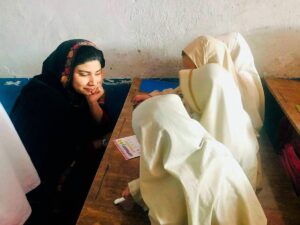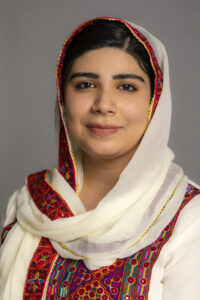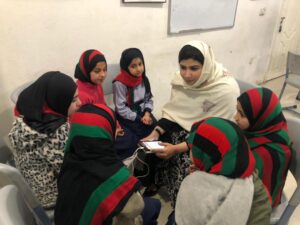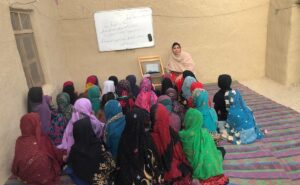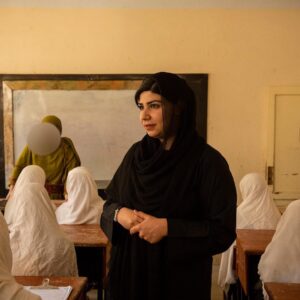Pashtana Durrani
Credentials
Humanitarian Cause
Education, Literacy Courses, Human rights, Women’s rights,
Impact Location
Afghanistan
Occupation
Founder, LEARN Afghanistan / Educator
Photo Gallery
About
Pashtana Durrani is an Afghan feminist, activist, and educator. At 21, she became the head of her family following her father’s passing. By then, she had already founded LEARN Afghanistan, the country’s first-ever digital school network. Forced into exile by the Taliban takeover in 2021, she is an International Scholar in Residence at Wellesley Centers for Women while continuing to provide education for hundreds of girls in Afghanistan despite the current ban on them attending school. Durrani is currently a Graduate student at Harvard School of Education.
Born in a refugee camp in Quetta, Pakistan, Durrani’s early life was shaped by displacement and the struggles faced by Afghan refugees fleeing the civil war and the Taliban’s rise to power. Despite these challenges, she speaks fondly of her childhood, particularly the support she received from her parents, who valued education above all else and encouraged her intellectual growth. Her father would bring her books from Afghanistan to teach her Pashtun and Dari, instilling in her a deep appreciation for her culture and a love for learning. This foundation of knowledge and support inspired her lifelong commitment to education.
However, it wasn’t until a visit to her family in Kandahar as a teenager that Durrani realized the gravity of the challenges facing Afghan girls. She witnessed firsthand the dangers they faced simply trying to get to school, as well as the deep desire among her younger female cousins to learn. These experiences prompted Durrani to take action, and in 2018, she founded LEARN Afghanistan, a grassroots organization aimed at delivering education to girls in underserved and impoverished regions of the country.
“Lack of education wasn’t a byproduct of poverty; it was a weapon. Denying it was deliberate and served a political purpose. It was meant to keep the girls silent, compliant, and disconnected from the world. It denied them a voice.”
LEARN initially focused on addressing the gap in digital literacy by providing tablet computers and offline platforms, enabling students to continue learning even without access to the internet. Over the next few years, the organization expanded its offerings to include professional training for teachers, menstrual hygiene management for girls, and a broader range of subjects such as biophysics, graphic design, and coding. By the time the Taliban regained power in Afghanistan in 2021, LEARN had educated over 7,000 children, trained 80 teachers, and worked with 700 girls on menstrual health education. Despite the political upheaval, LEARN continues to operate in secret locations across Afghanistan, ensuring that education remains accessible to those who need it most.
Pashtana Durrani’s work has been recognized on the global stage, and she has earned numerous accolades for her leadership and advocacy. She was named an Education Champion by the Malala Fund, a role in which she has helped amplify the importance of girls’ education, even under oppressive regimes. In 2021, she was awarded the Tällberg-SNF-Eliasson Emerging Leader prize, an honor given to individuals who have tackled complex global challenges with innovative solutions. Durrani was also named one of the BBC’s 100 Women and made it onto Time’s 100 most influential people list in 2021.
Durrani runs five underground schools in Afghanistan’s southern and central highland regions, with 631 students enrolled. She has been involved in ensuring pathways to education for young girls and women from rural and tribal backgrounds. Durrani focuses on solutions in education and healthcare and envisions 34 schools in 34 provinces of Afghanistan by 2025.
In her current role at the Wellesley Centers for Women, Durrani is continuing her research on how to best support Afghan women and girls, particularly in the areas of education and maternal health. One of her key goals is to study the international aid cycle, exploring how it can be improved to better serve the Afghan people and mitigate the corruption she has often witnessed in the humanitarian aid sector. Her focus is not only on providing immediate relief but on creating sustainable systems that will empower Afghan communities in the long term.
“My aim is to set up a transformative, alternative education agenda for girls based on digital technology that means they won’t be left behind during these years of Taliban rule. We have to take the power into our own hands. We will also be building digital infrastructure and the basis of a technology industry. There is no point in building school buildings right now – they just get bombed.”
The return of the Taliban has not extinguished Durrani’s vision for Afghanistan. While she has faced immense personal danger—going into hiding after the Taliban takeover and ultimately choosing to live in exile—her dedication to her homeland remains unwavering. Durrani is determined to lead by example, believing that if she is well-educated, she can be a more effective advocate for the people of Afghanistan.
“I am making sure Afghan girls and women are able to learn and earn. With the greatest respect, funding embroidery projects doesn’t work. Afghan girls deserve to meet the world in the 21st Century. That’s why we train girls in website design, coding, and graphic design. And we are helping them to find jobs with those skills. They are also studying math, physics, chemistry, history, Pashtun or Dari—as well as feminist perspectives on Afghan history.”
For many Afghan girls, education has become the ultimate form of resistance—a sacred pursuit that gives them hope in a world that often seeks to deny them their rights. Durrani wants to create a future where those who have once been silenced and oppressed will become champions of their own destinies.
The information on this page was last updated on 11/05/2024 and was provided by the Luminary.
